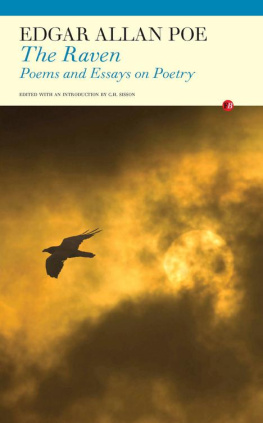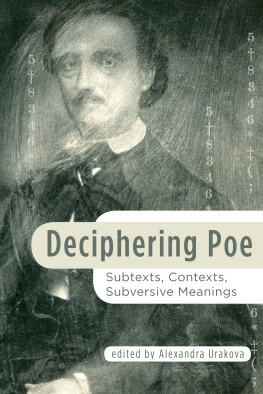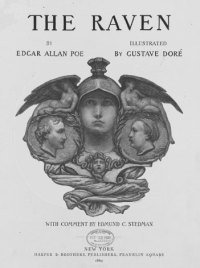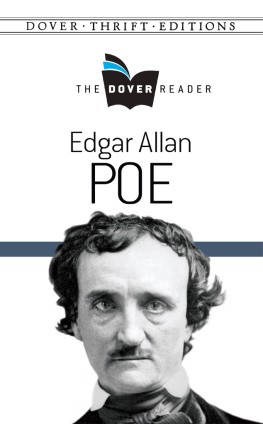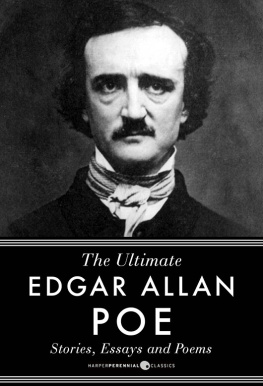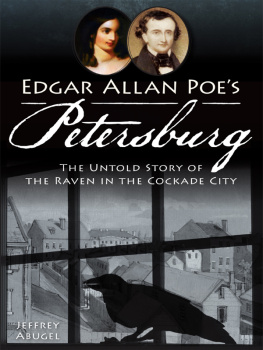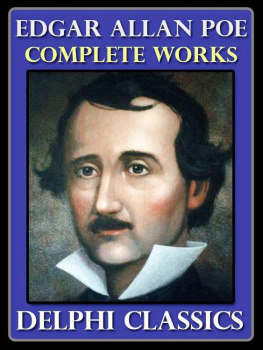Poe Edgar Allan - The Raven
Here you can read online Poe Edgar Allan - The Raven full text of the book (entire story) in english for free. Download pdf and epub, get meaning, cover and reviews about this ebook. year: 2012, publisher: Carcanet, genre: Science. Description of the work, (preface) as well as reviews are available. Best literature library LitArk.com created for fans of good reading and offers a wide selection of genres:
Romance novel
Science fiction
Adventure
Detective
Science
History
Home and family
Prose
Art
Politics
Computer
Non-fiction
Religion
Business
Children
Humor
Choose a favorite category and find really read worthwhile books. Enjoy immersion in the world of imagination, feel the emotions of the characters or learn something new for yourself, make an fascinating discovery.
- Book:The Raven
- Author:
- Publisher:Carcanet
- Genre:
- Year:2012
- Rating:3 / 5
- Favourites:Add to favourites
- Your mark:
- 60
- 1
- 2
- 3
- 4
- 5
The Raven: summary, description and annotation
We offer to read an annotation, description, summary or preface (depends on what the author of the book "The Raven" wrote himself). If you haven't found the necessary information about the book — write in the comments, we will try to find it.
The Raven — read online for free the complete book (whole text) full work
Below is the text of the book, divided by pages. System saving the place of the last page read, allows you to conveniently read the book "The Raven" online for free, without having to search again every time where you left off. Put a bookmark, and you can go to the page where you finished reading at any time.
Font size:
Interval:
Bookmark:
FyfieldBooks aim to make available some of the great classics of British and European literature in clear, affordable formats, and to restore often neglected writers to their place in literary tradition.
FyfieldBooks take their name from the Fyfield elm in Matthew Arnolds Scholar Gypsy and Thyrsis. The tree stood not far from the village where the series was originally devised in 1971.
Roam on! The light we sought is shining still.
Dost thou ask proof? Our tree yet crowns the hill,
Our Scholar travels yet the loved hill-side
from Thyrsis
Edgar Poe did not share any of those American ideas about progress, perfectability, democratic institutions and the other declared principles dear to the philistines of the two worlds. Thus Thophile Gautier who, only two years Poes junior, survived him by nearly a quarter of a century. Baudelaire, ten years younger than Gautier, was even more emphatic in advancing the thesis that Poe hardly fitted into his native country. The United States, he said, was for him a vast cage, a great counting-house, adding that all his life he made sinister efforts to escape the influence of this antipathetic atmosphere. Poe was, certainly, an isolated figure, but it would be wrong to attribute that simply to the social and political conditions in the USA in the first half of the nineteenth century. It is arguable that those conditions set him some problems he would not have encountered in western Europe, as they certainly precluded some solutions which would have been available in a more close-knit and less ramshackle society. But Poes dissatisfactions with his milieux, and his efforts to escape, were powered by personal peculiarities which were at once the source of his unquestionable originality and of the difficulties he encountered in exploiting it in a manner which would have both satisfied his vanity and provided him with something more recognisable as public success in his own country.
As things in fact turned out, Poes direct influence on American , and indeed on Anglo-Saxon poetry as a whole, was small. F.O. Matthiessen makes the incontrovertible point that, by one of the oddest turns of literary history, Poe has been assimilated into American poetry largely through what was made of him in France. And what was made of him in France was crucial to the evolution from Romantic to Symbolist poetry, and so, in turn, to Eliot and Stevens, to mention no others: thus, the French connection is worth some attention from the student of American poetry. Poes name was early associated with that of possibly the greatest French poet of the nineteenth century. It may seem odd, from the point of view of the late twentieth century, that it was not the Fleursdumal, but his translation of Poes tales, which first made Charles Baudelaire famous; so at any rate Gautier, who was well placed to know, assures us. Baudelaire to quote Gautier again naturalised this singular genius whose individuality was so rare, so marked, so exceptional and who first scandalised, rather than charmed, America. The translations were true to the style and thought of the original, with so faithful and so supple a liberty, that they produced the effect of original works. Baudelaire did not venture to translate the poems, except for pieces quoted in tales or essays, but in his introduction to the tales he spoke of them with respect and, one might say, wonder. Gautier had no doubt about the influence of Poe on Baudelaires own work.
It was left to Mallarm, twenty years Baudelaires junior, to produce a translation of the poems. Despite his own incomparable technical skill, Mallarm did not attempt a verse translation, and had he done so he would not have pretended that French verse could reproduce the technical features of the English original. What he does claim for his version is that it tries to render some of the extraordinary sonorous effects of the original music and, here and there perhaps, the feeling itself. Anyone with an ordinary reading knowledge of French will enjoy putting the two texts side by side.
If public attention in Paris went primarily to the tales, it was the application of Poes restlessly analytical mind so evident in the tales as well as in the writing which is specifically theoretical to what can only be called poetics, which most profoundly influenced the work of Baudelaire, Mallarm and Valry. Valry, whose mind was more consistently analytical even than Poes, went so far as to say that Poe was the first to think of giving a pure theoretical basis to literary works, adding words to the effect that the attempt to cut free altogether from old ideas and to start afresh on entirely analytical bases was his own contribution. With a little of the European, and specifically French, grand manner, he says that this great man would be completely forgotten today, if Baudelaire had not undertaken to introduce him into European literature. But he also underlines the importance of what Poe did:
in the midst of a people entirely busied about its material development, still indifferent to the past, organising its future and leaving the most complete liberty to experiments of all kinds, one man was found to consider the things of the mind and, among them literary production, with a clarity, a sagacity and a lucidity which had never yet occurred, to this point, in a head endowed with poetic invention. Never before Poe had the premisses of the subject been examined, reduced to a problem of psychology, and attacked by means of an analysis in which logic and the mechanics of effects were deliberately engaged.
One can hardly, without astonishment, turn from such eulogies, from the summits of literary intellectuality in Paris, to the actual conditions of Poes origins and education, or indeed to the course of his public literary life. He was born in Boston in 1809. No great reliance is to be placed on his own statements about his family and upbringing, and it must be said that, at various times of his life, he exhibited a less than average addiction to the truth. The facts seem to be that his parents were both actors his mother, at least, one of some talent. She died before he was three years old; his father seems to have disappeared shortly before that date. Edgar was the second of three children. After the death of their mother Edgar was looked after but never adopted by John and Frances Allan, who lived in Richmond, Virginia. Allan was a tobacco exporter and general merchant, well off, certainly, by any standard to which the Poe family were accustomed. When Edgar was six, the Allan family went to England on an extended business trip. They took the boy with them, and for five years he had an English education, latterly at a school in North London. There he was known by the name of Allan, but, on returning to Richmond, he reverted to that of Poe possibly a sign that John Allan was distancing himself from him. However that may be, in 1826 he was sent to the University of Virginia. That lasted only a year: he found himself among rich young men and appears to have been determined not to be out-done at card-playing and drinking; he ran up debts which Allan declined to pay. In March, 1827, he left the Allans house, in his own words to find a place in the wide world where he would not be treated as Allan had treated him. He went off by ship to Boston, where he joined the army, but not before he had arranged for the printing of forty copies of a book of his poems presumably as a visiting card rather than in the hope of making a fortune. When Frances Allan died in February, 1829, John Allan not only bought Edgar a suit of black clothes but supported his release from the ranks of the army and his re-enlistment as a cadet at West Point. This did not last: Poe deliberately forced the authorities to expel him. Early in 1831 he was in New York, and published a revised and expanded edition of his poems.
Font size:
Interval:
Bookmark:
Similar books «The Raven»
Look at similar books to The Raven. We have selected literature similar in name and meaning in the hope of providing readers with more options to find new, interesting, not yet read works.
Discussion, reviews of the book The Raven and just readers' own opinions. Leave your comments, write what you think about the work, its meaning or the main characters. Specify what exactly you liked and what you didn't like, and why you think so.

